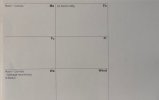ivanjay205
Registered
Hi everyone! I use OmniFocus today and have been loyal to GTD for quite some time. I am 100% digital and I like that for many reasons! However, I am re-reading 7 habits of highly successful people and picking up some tidbits of information plus doing my own "soul searching" with the New Year to improve my productivity.
I have experimented with paper planners.... During the work week I love them, I prefer not having technology in meetings for focus reasons. I enjoy having my calendar, and tasks, and notes in my face to keep me centered on my obligations for the day. I find that in my digital world I get sucked into what I am doing and lose sight of a meeting I have because my calendar is not in view, etc. Omnifocus does not show my calendar items so with my calendar out of sight out of mind I have to bounce around to know what is on my agenda for the day. However, at night and on weekends I really want to stay digital. I am realistic, and I am not carrying around a planner. I need to record and capture things all the time. I also do not enjoy re-writing in a planner constantly.
I have used the full focus planner in the past and like it as it adopts a lot of GTD systems but not entirely.
I am curious if anyone uses a hybrid approach or physical planner for GTD and how they feel about it? I cannot imagine maintaining my lists and projects in a physical planner as I have lots and lots and lots in my role! However, I could see maybe keeping my bigger system digital and taking a one week chunk and allocating work into my physical planner each week. But I guess that goes a bit against GTD constructs.
Any thoughts on how you do it?
I have experimented with paper planners.... During the work week I love them, I prefer not having technology in meetings for focus reasons. I enjoy having my calendar, and tasks, and notes in my face to keep me centered on my obligations for the day. I find that in my digital world I get sucked into what I am doing and lose sight of a meeting I have because my calendar is not in view, etc. Omnifocus does not show my calendar items so with my calendar out of sight out of mind I have to bounce around to know what is on my agenda for the day. However, at night and on weekends I really want to stay digital. I am realistic, and I am not carrying around a planner. I need to record and capture things all the time. I also do not enjoy re-writing in a planner constantly.
I have used the full focus planner in the past and like it as it adopts a lot of GTD systems but not entirely.
I am curious if anyone uses a hybrid approach or physical planner for GTD and how they feel about it? I cannot imagine maintaining my lists and projects in a physical planner as I have lots and lots and lots in my role! However, I could see maybe keeping my bigger system digital and taking a one week chunk and allocating work into my physical planner each week. But I guess that goes a bit against GTD constructs.
Any thoughts on how you do it?

